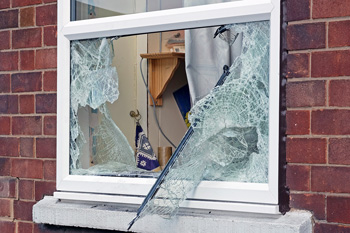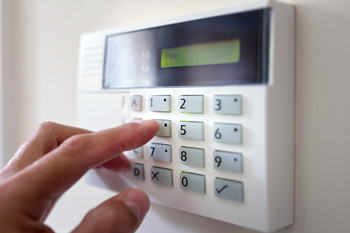Home Protection
- Get Prepared
- General Safety
- Current: Home Protection
During 2023, more than 13,000 burglaries occurred across Indiana. Securing homes against burglary or home invasions is a logical step in protecting property and personal safety.
Preventive measures can minimize the threat of a break-in or home invasion. Some home invasions are crimes of opportunity and securing a home can protect against this. However, many instances are planned, and intruders may have been watching the neighborhood for several days. Be aware of people in the neighborhood and contact local police if something seems concerning or out of place.
Home Protection Safety Tips
Quick Tips
- Lock or secure windows and doors, both while home and out of the house.
- Never leave a spare key hidden under a rock or door mat.
- Keep purses, car keys, money and jewelry away from windows.
- Never open the door to strangers. This is especially important to teach children.
- If a weapon is part of the home defense plan, seek training on how to properly use and secure the weapon. Practice skills regularly.

Outside the Home
- Lock or secure windows and doors, both while home and out of the house.
- Placing a bell, chime or other noisemaking item on a door can provide early warning that visitors have arrived. The noise may also cause potential intruders to reconsider plans.
- If possible, reinforce doors and locks to make kicking in doors more difficult.
- If living in an apartment where improvements are not possible, consider using a door barricade bar while in the home and secure sliding glass doors.
- Never leave a spare key hidden under a rock or door mat.
- Cut back trees or bushes near windows and doors that could provide concealment.
- Make sure the home is lit well at night, to eliminate concealment opportunities.

Inside the Home
- Consider investing in an alarm and advertise that the home has one by placing stickers in windows and signs in the yard.
- Have emergency plans and protocols set up where children or teens can see them. Additionally, have important contact phone numbers next to the plan.
- Designate a safe room that can be secured from the inside and educate all household members on where to go in a crisis. Verify that the room has a charged cell phone and/or functioning landline phone, a flashlight, a first-aid kit and emergency water.
- Close all curtains and blinds at night.
- Keep purses, car keys, money and jewelry away from windows.
- Choose and practice various escape routes from the home.

Personal Training
- Teach family members to be observant of their surroundings and aware of suspicious activity when coming home. Call the police if someone is acting suspiciously.
- Never open the door to strangers. This is especially important to teach children.
- Teach members of the household how to call 911 and have a script ready for them to read to the dispatcher. This will help them calmly explain the emergency situation.
- Teach children to call trusted adults for help in cases when adults are not at home.
- If the designated safe room is used, shelter in place until police arrive.
- If a weapon is part of the home defense plan, seek training on how to properly use and secure the weapon. Practice skills regularly.
